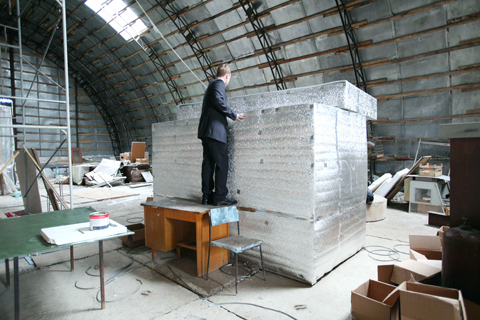“I don’t ever want to die ... It wouldn’t suit me,” Innokenty Osadchy said.
Fortunately, the 35-year-old investment banker is certain he has found a loophole out of death.
Osadchy is ready to pay a small fortune to freeze his brain until future technology allows him to continue his life — after being transplanted into a new body and resuscitated.

PHOTO: AFP
“Why do I have to die in a couple decades? I don’t see any logic in this,” Osadchy said. “It won’t be another life, it’ll be the continuation of my life. I don’t ever want to die, ever. Not in a year, not in a million years.”
Osadchy and other clients of Russian cryonics company KrioRus believe the brain operates like a computer hard-drive and its contents can be frozen and stored for the future.
“We know that the personality is stored in the brain. So when a person’s body is old, there’s no reason to keep it,” said Danila Medvedev, who runs KrioRus, the first cryonics outfit outside the US.
“We tell our clients it’s cheaper, safer and probably better preservation just to freeze the brain,” said Medvedev, a smart executive sporting a suit and an iPad.
Cryonics — or the freezing of humans in the hope of future resuscitation — is illegal in France and much of the world, but KrioRus has stored four full bodies and eight people’s heads in liquid nitrogen-filled metal vats.
While a few are kept at home by their client’s relatives, most are lumped together in containers at the firm’s rusting warehouse, where an old desk now serves as a step to allow visitors to peer into the icy mist where the bodies are stored.
“You would just need to launch their hearts ... then you have a person who is living again,” Medvedev said, counting on the swift progress of nanotechnology and medicine to help reverse the initial cause of death. “Once you can do that kind of nano-surgery at the cellular level ... you can take a person from cryo-stasis; warm him up gradually and then he will be alive.”
Since its 2005 launch, KrioRus has been building new vats, in anticipation of the 30 clients, like Osadchy, with whom it already has contracts.
The fee is US$10,000 for a brain freeze and US$30,000 for the full body — all upfront — because, “when you have a person who is dead as your client, you set up to allow people to pre-pay,” Medvedev said.
“In the case of death, the only chance now is cryo-storage,” Osadchy said.
“It was always clear to me that vampires, heaven and hell, and everything godly and supernatural, wasn’t real,” he said.

Auschwitz survivor Eva Schloss, the stepsister of teenage diarist Anne Frank and a tireless educator about the horrors of the Holocaust, has died. She was 96. The Anne Frank Trust UK, of which Schloss was honorary president, said she died on Saturday in London, where she lived. Britain’s King Charles III said he was “privileged and proud” to have known Schloss, who cofounded the charitable trust to help young people challenge prejudice. “The horrors that she endured as a young woman are impossible to comprehend and yet she devoted the rest of her life to overcoming hatred and prejudice, promoting kindness, courage, understanding

Tens of thousands of Filipino Catholics yesterday twirled white cloths and chanted “Viva, viva,” as a centuries-old statue of Jesus Christ was paraded through the streets of Manila in the nation’s biggest annual religious event. The day-long procession began before dawn, with barefoot volunteers pulling the heavy carriage through narrow streets where the devout waited in hopes of touching the icon, believed to hold miraculous powers. Thousands of police were deployed to manage crowds that officials believe could number in the millions by the time the statue reaches its home in central Manila’s Quiapo church around midnight. More than 800 people had sought

Cambodia’s government on Wednesday said that it had arrested and extradited to China a tycoon who has been accused of running a huge online scam operation. The Cambodian Ministry of the Interior said that Prince Holding Group chairman Chen Zhi (陳志) and two other Chinese citizens were arrested and extradited on Tuesday at the request of Chinese authorities. Chen formerly had dual nationality, but his Cambodian citizenship was revoked last month, the ministry said. US prosecutors in October last year brought conspiracy charges against Chen, alleging that he had been the mastermind behind a multinational cyberfraud network, used his other businesses to launder

Uncontrolled fires burned through bushland in the Australian state of Victoria yesterday, forcing communities to evacuate and authorities to warn of a “catastrophic” fire danger rating for today. Amid temperatures that exceeded 40°C in parts of the state, two large bushfires were raging near the towns of Longwood and Walwa. The fires had destroyed at least two structures and were expected to continue to spread today as heat and wind pick up, authorities said. The Longwood fire had grown to more than 25,000 hectares in size, while the Walwa fire was 10,000 hectares and has created its own weather system, with a pyrocumulonimbus